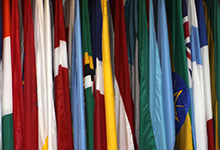
Typical street scene in Santa Ana, El Salvador. (Photo: iStock)
IMF Survey : Historic Reforms Double Quota Resources and Enhance Voice of Emerging and Developing Economies
January 27, 2016
- Quota and governance reforms agreed in 2010 are approved
- Package strengthens influence of emerging markets
- Approval paves the way for 15th review
The 2010 IMF quota and governance reforms that took effect yesterday will strengthen the voice and representation of emerging and developing economies in the institution; reinforce the legitimacy of its decision-making process; and equip it with more permanent resources to better respond to future crises.

IMF quota and governance reform: For the first time, four emerging market countries (Brazil, China, India, and Russia) will be among the 10 largest members of the IMF. (photo: IMF flags)
IMF GOVERNANCE
“I commend our members for ratifying these truly historic reforms,” IMF Managing Director Christine Lagarde said. She noted that a more representative, modern IMF will ensure that the institution is able to better meet the needs of its members in a rapidly changing global environment.
“Today marks a crucial step forward and it is not the end of change as our efforts to strengthen the IMF’s governance will continue,” Lagarde added.
Significance of quota and governance reforms
This historic change marks an important step forward for the IMF.
First, the reforms significantly increase the IMF’s quota resources and its ability to respond to crises more effectively. The combined quotas (or the capital countries contribute) of the IMF’s 188 members will increase to a combined SDR 477 billion (about US$659 billion) from about SDR 238.5 billion (about US$329 billion).
Second, they also improve the Fund’s governance by better reflecting the increasing role of dynamic emerging and developing countries in the global economy. More than 6 percent of quota shares will shift to dynamic emerging market and developing countries and also from over-represented to under-represented IMF members. As a consequence, four emerging market countries (Brazil, China, India, and Russia) will be among the 10 largest members of the IMF. Other top 10 members include the United States, Japan, and the four largest European countries (France, Germany, Italy, and the United Kingdom).
The 2010 agreement will also enhance the effectiveness of IMF’s decision-making, including in its 24-member Executive Board. For the first time, the IMF’s Board will consist entirely of elected Executive Directors, ending the category of appointed Executive Directors (currently the members with the five largest quotas appoint an Executive Director).
At the same time, the quota shares and voting power of the IMF’s poorest member countries will be protected. Moreover, advanced European countries have committed to reduce their combined Board representation by two chairs by the next regular election of Executive Directors that will take place this fall.
Next Steps
These reforms reflect major shifts in the global economy. The 2010 reforms—which built on reform steps in 2008 and followed extensive consultations involving member governments and outside stakeholders—take into account the changing realities of the global economy, and notably the growing weight and role of dynamic emerging and developing economies.
The ratification of the 2010 reforms also clears the way for the Fund to begin the 15th review of its quotas. The 15th review will provide an opportunity to discuss the size and composition of IMF resources and the distribution of quota shares among the Fund’s membership.


